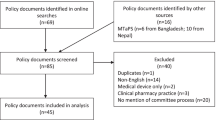Abstract
There is a current debate about conflict of interest among external government advisors in the United States Food and Drug Administration (FDA). One point of focus has been the industry affiliations of advisory committee members to the FDA’s Center for Drug Evaluation and Research (CDER). The concern is that such affiliations may introduce a bias into a committee’s recommendation to either approve or not approve an individual drug. Missing from this debate is an understanding of how federal legislation and other political institutions have influenced the structure, functions, and activities of these advisory committees over time. This paper examines the factors that have shaped and limited the role of CDER’s advisory committees. The discussion shows how federal legislation initially created a role for these committees and how federal rules and regulations have further defined and constrained that role over time. The paper also describes how administrative procedures employed by the FDA are used to manage conflicts of interest and how these procedures may reduce the likelihood of any bias affecting drug approval decisions.
Similar content being viewed by others
References
Cauchon D. FDA advisors tied to industry: Drug-approval process riddled with conflicts of interest, analysis finds. USA Today Sept. 25, 2000: 1A.
Conflicts of interest in U.S. advisory panels. Scrip Daily News. Aug. 30, 2000: 2570/71.
FDA meetings should exclude members with conflicts of interest. Pink Sheet. June 26, 2000: 9.
House investigates panels involved with drug safety. Washington Times. June 18, 2001:A1.
Food and Drug Administration. Policy and Guidance Handbook for FDA Advisory Committees. Washington DC: Food and Drug Administration; 1994.
Institute of Medicine. Food and Drug Administration Advisory Committees. Rettig ER, Earley LE, Merrill RA, eds. Washington, DC: National Academy Press; 1992.
Federal Advisory Committee Act, s3(l), 1972.
Smith BLR. The Advisors: Scientists in the Policy Process. Washington DC: Brookings Institution; 1992.9.21 CFR 14.171, 1993.
Guidance for industry on advisory committees: Implementing Section 120 of the Food and Drug Administration Modernization Act. Federal Register Nov. 2, 1998: 58746.
United States Department of Health and Human Services. FDA Public Advisory Groups: Authority, Structure, Function, Members. Washington, DC: Department of Health and Human Services; 1999.
Disclosing Information Provided to Advisory Committees in Connection with Open Advisory Committee Meetings Related to the Testing or Approval of New Drugs and Convened by the Center for Drug Evaluation and Research, Beginning on January 1, 2000. Draft guidance, http://www.fda.gov/cder/guidance/3479dft.htm.
Food and Drug Administration. Waiver Criteria Document 2000. Washington DC: Food and Drug Administration; 2000.
Food and Drug Administration. FDA Advisory Committees. http://www.fda.gov/ohrms/dockets/ac/acmenu.htm
Interpretation, exemptions and waiver guidance concerning 18 U.S.C. 208. Federal Register. Sept. 11, 1995: 47220.
Author information
Authors and Affiliations
Additional information
The views expressed in the article are those of the authors and do not reflect those of the Department of Health and Human Services or the Office of the Inspector General.
Sara Schulman is now a program analyst in the office of the Inspector General, U.S. Department of Health and Human Services.
Rights and permissions
About this article
Cite this article
Schulman, S., Olson, M.K. & Makuch, R.W. Which Factors Shape and Limit the Role of the Center for Drug Evaluation and Research’s Advisory Committees?. Ther Innov Regul Sci 36, 281–289 (2002). https://doi.org/10.1177/009286150203600206
Published:
Issue Date:
DOI: https://doi.org/10.1177/009286150203600206



